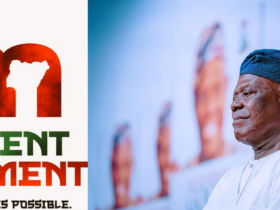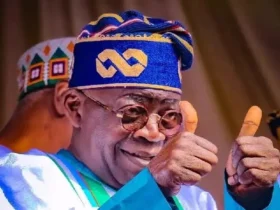Adeolu Adeboye, son of Pastor Enoch Adeboye, the General Overseer of the Redeemed Christian Church of God, allegedly received over N8 billion from the Kaduna State Government for a contract but abandoned the project after completing only 30% of the work.
According to SaharaReporters, Adeolu and his wife secured the contract through Ronchess Global Resources Plc during former Governor Nasir El-Rufai’s administration.
However, the couple has reportedly been avoiding accountability for the misused funds and the incomplete project.

Following investigations by the Kaduna State Government and the House of Assembly into the alleged fraud, Adeolu filed a lawsuit (FHC/L/CS/1206/24) at the Federal High Court in Lagos.
In the suit, Adeolu seeks an injunction to prevent the Economic and Financial Crimes Commission (EFCC), the Kaduna State Government, and the House of Assembly from arresting or detaining him in connection with the abandoned N17.26 billion project.
The EFCC, Inspector General of Police, Assistant Inspector General of Police, Commissioner of Police Lagos State Command, Kaduna State Government, and Kaduna State House of Assembly are named as respondents in the case.
On May 16, 2024, a team from the Kaduna State House of Assembly visited the Wusasa to Danmagaji Nagoyi Road project site in Kaduna North Local Government Area and discovered that the project, an 8km road in Zaria, had been abandoned by Ronchess Global Resources Plc, owned by Adeolu.
The project, initially valued at N8.74 billion and later revised to N17.26 billion, was supposed to be completed within 18 months, with a target date of January 2, 2021.
However, despite receiving N8.2 billion, only 30% of the work was done before it was abandoned.
To halt the ongoing investigation, Adeolu sought an “interim order” from the court, restraining the respondents from arresting or detaining him in relation to the project, pending the final determination of his Motion on Notice for an Interlocutory Injunction.
Justice K.O. Ogundare of the Federal High Court in Lagos granted the interim order, preventing any further actions against Adeolu by the respondents until the hearing and final determination of the motion.
However, the EFCC, in a counter-affidavit filed by Mohammed Arabo, an agency staff member, stated that their investigation uncovered evidence of fraud and the criminal diversion of public funds involving Adeolu and 26 other contractors.
Arabo, who was part of the EFCC investigation team, confirmed that the agency found substantial evidence against Adeolu.
He further deposed that the “Applicant’s company, Ronchess Global Resources Plc abandoned the jobs even though the level of completion is 30%”.
Arabo confirmed that the “Applicant’s company, Ronchess Global Resources Plc has collected a sum of N8,185,014,328.95 (Eight Billion, One Hundred and Eighty Five Million, Fourteen Thousand, Three Hundred and Twenty Eight Naira, Ninety Five Kobo) even though the level of completion of the jobs is only 30% (thirty percent)”.
He said, “In line with the practice of the 1st Respondent (EFCC), we sent invitation letters to the aforementioned contractors, including the Applicant, to enable them to react to the allegations made against them by the 6th Respondent.
“The 1st Respondent invited 35 contractors indicted by the 6th Respondent. 16 Contractors reported and made statements to the 1st Respondent’s team while 9 others have requested to report at a later day.
“The Applicant is one of the 10 other contractors that rushed to this Honourable Court for judicial cover from investigation.”
The legal team representing the EFCC includes Femi Falana (SAN), Mrs. Funmi Falana (SAN), and Chukwuma Onwuemene Esq., all from Falana & Falana’s Chambers. The cleric’s son is represented by a team from Ebun-Olu Adegboruwa SAN & Company, consisting of Ebun-Olu Adegboruwa (SAN), Adedoyin Adesoji Esq., Oluwatosin Adesioye Esq., Omia Ejewentotor Esq., Ayorinde Ogundeji Esq., Emmanuel Omohavwa Esq., Percious Chukwu Esq., and Hannah Ayanwale Esq.
In the written address for the EFCC, presented by Falana (SAN), he expressed concern over the growing trend of misusing the Fundamental Rights (Enforcement Procedure) Rules.
He observed that legal practitioners often exploit these rules in an attempt to elevate their claims and emotionally pressure the court into granting a speedy hearing, a practice that has become increasingly common in courtrooms.
One key issue for determination was whether the high court has the jurisdiction to hear and decide the Applicant’s case when the alleged breaches of fundamental rights are not the central claims.
Falana contended that the essential question was whether the Applicant’s claim qualifies as an enforceable infraction of fundamental rights.
The EFCC’s counsel further argued that for a claim to be considered a fundamental rights issue, it must be evident that the primary relief sought is for the enforcement or securing of a fundamental right.
If the claim primarily seeks to address a grievance that is merely ancillary to the principal relief, which is not inherently a fundamental rights issue, it does not qualify as such.
Falana emphasized that claims of rights violations cannot be treated as a universal solution to all legal grievances, nor should they automatically trigger the enforcement of constitutional rights without proper justification.
Follow the Parallel Facts channel on WhatsApp: https://whatsapp.com/channel/0029VaCQSAoHgZWiDjR3Kn2E









Leave a Reply